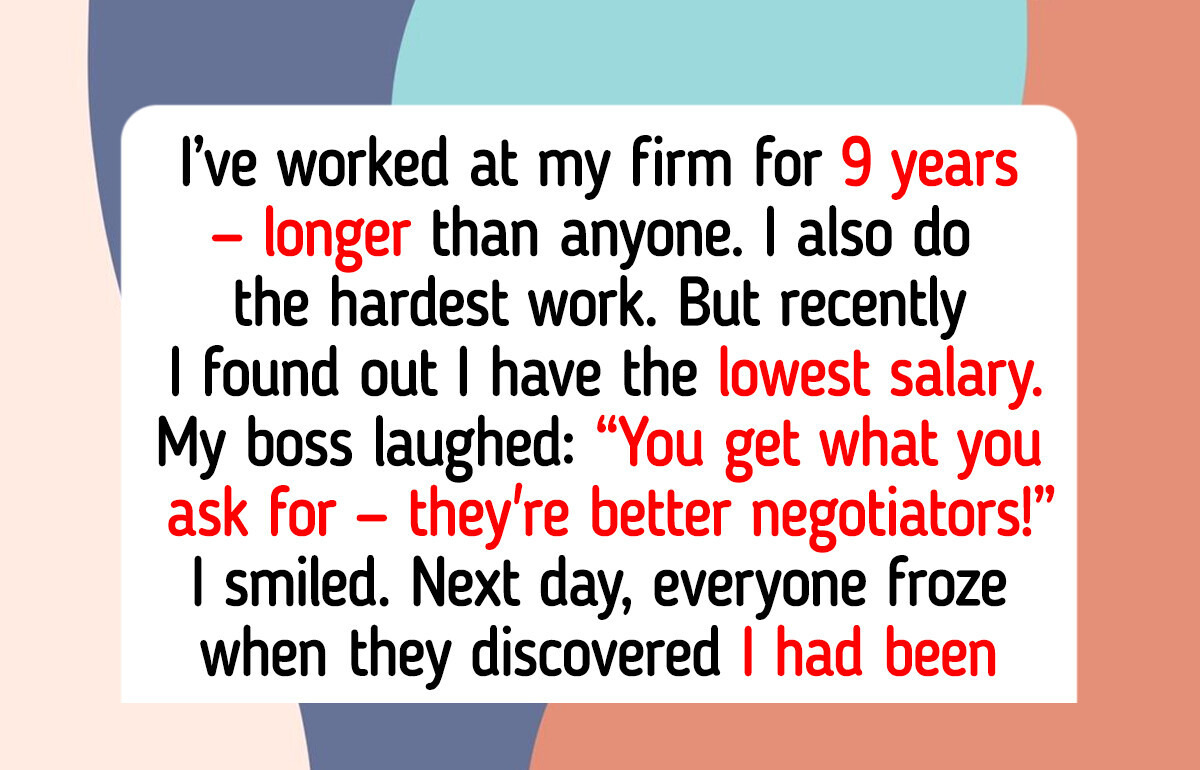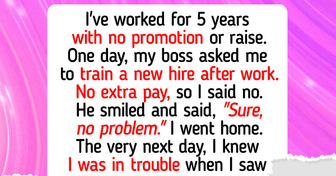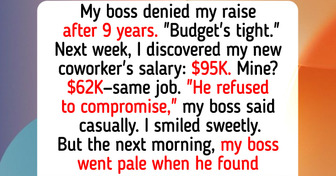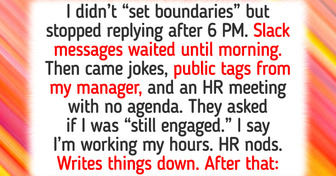Hard story to believe
I Refuse to Have the Lowest Salary Despite Being the Oldest on My Team

Many employees work hard for years, hoping their dedication will pay off, but sometimes companies fail to recognize true loyalty. Finding out you’re the lowest paid despite years of experience can be a painful wake-up call about fairness and respect at work. One of our readers recently shared her story about facing this exact situation after discovering her paycheck didn’t match her commitment.
Nancy’s letter:
Dear Bright Side,
I (36, F) have worked at my firm for 9 years—longer than anyone else there. I’ve always done the hardest work, stayed late when needed, and handled weekend calls whenever a deadline was near.
I’ve poured my time, energy, and loyalty into the company, always making sure clients were happy.
But recently, I was shocked when I accidentally found out that I have the lowest salary in my team of 10.
I confronted my boss, but he laughed and said, “You get what you ask for! They’re better negotiators!”
I just smiled and left his office. The next day, everyone froze when I sent an email. I attached various job offers and messages from recruiters who’d been trying to hire me for years. I had been approached by several competitor firms, but always declined.
But now, I announced in the email that I’m giving my two weeks’ notice and leaving.
10 minutes later, HR called me in for an urgent meeting. My boss was there too, suddenly full of concern and apologies. They offered me a raise—one that would make me the highest-paid on the team.
But it was too late. I know they need me because many of their clients rely on me, so losing me would be a big problem for them. I told them my mind was made up.
Still, I wonder—am I being too emotional? After 9 years of hard work, should I stay?
Am I making the wrong choice to leave?
Sincerely,
Nancy

Stay until you actually have a job lined up with the money you want. They showed there true colors. But make sure you have another job first.
That email you sent was one of the most brilliant "negotiating " techniques I've ever seen. It's too bad you didn't capitalize on its obvious success in waking up your boss and HR! You should also thank your boss for inadvertently giving you the idea, and just enough of a (albeit negative) push to "git er done!"
I remember when I was just out of University, there was a well known, nationwide corporation that I really wanted to join. I applied at every one of their offices that I could find with nary a reply. Then I had an idea similar to yours. I made copies of ALL the letters I had sent to ALL their various offices around the country, and sent them, along with a copy of my resume, to the last office on my list. It got me the desired interview, teaching me that PERSISTENCE does indeed pay!
Yes, go for a better offer then not been appreciated by your boss.
Advise them if they will make your raise retroactive for five years and pay you the lump sum immediately you will stay! Otherwise move on quickly!
I would say do this, and if they do agree, which i doubt, take the lump sum and then leave anyway
It's time to move on.
You've discovered that they do not respect you and I will tell you that they never will until you leave.
I tell you this as a manager who has worked for companies like this in the past and had to fight tooth and nail to get my direct reports that they deserved. A company like this will always use you and drop you when you're used up.
Dear ..Good Morning 🌄..It is the right move and decision 👍 Good Luck
Yes, you're being too emotional
No she's not. You must work for her former company. They thought she was a joke until they realized that they fafo.
Depends. You're boss was right, you get what you negotiate. Now's the time to negotiate. Get what your worth, not what they offer. If not, then move on. GOOD LUCK!
I would say accept on condition they backdate it for a year at least, then you'll see how much they value you. Just remember it's a negotiation
On to greener pastures with lesson learned. They do not respect you or your contributions. Above and beyond is expected and rarely rewarded. If you stay they will know you have a price and will pile on more for due to the raise that should have been given long ago for the work you were already doing and you'll be in the same position.
Tough choice. I would consider giving your boss a chance although they are unlikely to appreciate your effort and you would need to remind them to remember to give you the raise next time. But considering your boss are not so mean. It is worth considering giving him and your company a chance.
That comment from her boss was not mean, it was degrading. They are only offering the raise out of the goodness of their hearts but because they are desperate.
This most important thing you ever learn is to value yourself. Good managers do not promote the "best negotiator" unless your job is all about negotiating. Otherwise, they are about seeing to THEIR team's professional development as well as seeing those who produce are rewarded or explaining why not. The biggest problem is always being kept down artificially to be their beast of burden. Leave and do not look back. You owe them the respect they gave you... nothing. Those good negotiators better get to work...Chop Chop.
Leave and don't look back!! They don't want you, just what you do for them. Respect yourself, because they don't.
No you are not making the wrong decision they knew they were paying you wrong so now you just have to be a person for yourself
U dun the right thang I wood stay if they doubled the offer that they wood if knot I'd walk
Try a bit harder, and if you're as smart as you THINK you are, you'll figure out what Ellison is saying.
Tell them you'll consider staying if they paid the difference in your salary from everyone else's going back however long it all started🤣. You clearly deserve it. The 'better negotiators' comment was a bitch move
I stand with you on this. I have seen similar cynical treatment of loyal and highly qualified craftsmen. I worked (I can tell you now) at the Larson Company in Tucson, at one time the largest and most respected exhibits builders in the world. They hired the best people, but those people, despite their impressive skills were always the first fired when business inevitably slowed. It was a cost-cutting. Their best talent (women and men who had advanced degrees in fine art) were the most highly paid. We had an elite crew who did only dinosaurs.Their foreman, Tim Joyette -not his real name- was the best in the business. But they laid him off when they reckoned they were paying him too much. He took his crew with him. He usurped all their dinosaur business.
Gents would come in saying, 'We want to build a dinosaur theme park in Dubai, and, of course, we want Joyette; O, you say, he doesn't work here anymore? Give us his info.' Six months later Larson was out of business. Stick to your guns, my friend, those jerkoffs you worked for didn't deserve you, and I hope they got the royal shaft.
I remember the Larsen Company! Didn’t know they folded. Sounds like karma too me! 😂
You're doing the right thing by leaving. The company knew what was going on, pay-wise, but they continued to exploit you. If they didn't appreciate you and treat you with respect BEFORE you have notice, they won't do it after you gave notice. Never accept a counter offer, either. Now that the company knows you're in play and seeking another job, they will hold onto you for just long enough to hire someone new and have you train them, then they'll let you go. Accept any of rhe new offers and out the current company in your rear view mirror.
I wouldn't have shown them all your previous job offers that you turned down. It confirms to them that you are in fact weak. Take the new job, otherwise, they'll be snickering (not so quietly) behind your back
The boss is partially right. If OP didn't ask for raises, that's not on the boss. Once the OP made it an issue, the company stepped up. Now, the negotiations begin. More pay, maybe a few more paid vacation days, maybe a percentage increase based on merit, not waiting to be asked. If the OP decides to stay, make them sweat. Go on at least one interview.
Horse manure. Every foreman recognizes his best hand, or he should. It is his responsibility to make commendations, and to keep his best people with him.
It is their fault!! Employees should be acknowledged and given raises based on their performance!! Not have to go beg for money!! That's ridiculous
Change is good. In saying that don't cut off your nose to spite your face. Leave on good terms in case the grass isn't greener in new company. Best of luck.
If the other job offers pay more than your present job will (including their new raise), take it. Or, if the new job is comparable in pay but is a better work environment for you, go with that.
Nope. I worked 12 years at a retail firm. Before I was made a manager I was in manager training at what seemed like forever doing all the jobs of an assistant manager (at a lower salary). Due to number of things happening all in one month I gave my notice but somehow it hadn't trickled up to the higher management of the business until the day I was quitting. Suddenly, management figures that had barely said more than hello to me for years, were try to talk me out of quitting. It was very eye-opening- they warned me, give me veiled threats, then tried to advise, cajole and bribe me and to staying. They gave me a warm feeling all over - ha ha. I knew the real reason they were so anxious to keep me was they would get bitched at for losing someone and they would have to work hard covering my spot till they found somebody. Good.
If you stay they won't value you. I'm in a similar situation but can't find another job, I've tried.
Don't give them the time of day just go to the new job knowing you have the talent and skills you need and don't let this happen again.
You could have quietly negotiated that decent raise and continued working without showing how rattled you were about their response...
Maybe looking back you did let those initial emotions jolt you ND trigger all these next reactions however if you are truly tired of this place dont like the people who never gave you the respect you deserve wanting out then go with a fresh new start. Just be sure what new environment you are stepping into...wouldn't want it to feel more toxic than the place you are leaving
Sometimes the biggest paycheck doesn't actually mean you are going to be the happiest there
but you will know and I wish you the best outcome
This is the best advice today. Knee jerk or emotional reactions almost always cause a bad decision. Step away for a moment , even go on an interview or 2.
I appreciate this article! As women, we are considered the weaker vessel, and in some ways that's true; however, Our Creator has given each of us particular gifts, and our gifts will make room for us! Stay focused and continue to listen for His Voice and He will direct you! The Word of God says in Proverbs chapter 3 and verses 5 and 6 ""TRUST IN THE LORD WITH ALL THINE HEART, AND, LEAN NOT TO THY OWN UNDERSTANDING; BUT, IN ALL THY WAYS ACKNOWLEDGE HIM AND HE SHALL (NOT MAYBE) , SHALL DIRECT THY PATH!" 🤗🌷⏰️
Never stay where you aren't respected. Payback is .........
Tell your boss if he gives you back pay for those 9 years, you will consider.
Make sure you tell your old boss that "he gets what he paid for" as you walk out the door!
Unfortunately, deliberately under-paying valuable, dedicated employees has become all too common in today's corporate culture. Often, the only way to get the kind of raise that is commensurate with your skill and experience is to move to a competing company. So take the new position and don't look back.
No you should go where you are wanted when you talked to your manager he basically told you you are weak and not worth any extra i hope you enjoy your new job if you wake up happy to go to work thats all that matters
I am an emotional doer so I see your dilemma.
The facts are facts,
Disrespect was there
They didn't value you.
But you didn't value yourself.
Is there any benefits to the job - besides the money.
Do you wake up anxious or happy to go to work?
Does it fit around family responsibilities?
Does it give you a work life balance.
Before I continue - YOU deserve the pay rise. OBVIOUSLY and take it if you stay. But before you consider jumping ship, consider the above.
Sure you could go to a job that pays you more and seems to "value/respect" from the offset.
But money is not the fix all solution.
Money is not the only thing a work place can offer.
Most importantly The best lesson to get from this is to value yourself!
Ask for a late bonus of $50000 for each year you have been working there
While the boss may have been right about your nego skills, it is your manager's responsibility to apply equity to everyone's inputs. Your boss was irresponsible.
Stay but get a golden parachute contract and have them backdate the raise and pay interest on the owed amount.
I would stay if they went back and counted the hours they fucked me over and gave me the back pay I deserve
Bye! Know your worth and chin up when you clean out your space.
Never stay after you've given notice. They showed you what they thought of you.
Know your worth..you've learned it. Now move on...forward ➡️
well done. always stick to your principles. this is why you are supposed to change jobs every 4 years or so. because if you stay at the same place for too long, they take you for granted and thats why they underpaid you and under appreciated you. my ex-manager told me if your employer treats you like crap, then quit and go work for the competition. regardless of whether the competition pays less or more, its about principle and doing the right thing. go where you are treated best and appreciated. well done and congratulations. you should have quit much sooner!
I'd leave. Boss thought it was funny to underpay you
This! He didn't apologize or acknowledge OP's worth. Just laughed at having been able to take advantage of her.
Always ask 20 to 60 percent what the standard industry is offering it works my salary average is $60k I asked for $97k and got it ,we'll you have to be good at what you
were hired on for
Your comment makes no sense. Don't you mean ask 20 to 60% more than the industry average?
I would have simply said "f*** off"😏👅🖕
Well, you got what you asked for but don't be surprised if you decide to stay they slowly give your clients to other team members. As for leaving, it depends how cut throat your business is and how "high school" they act and if everyone knows everyone and talks.
Don't know whatcha got til it's gone - Cinderella
Nope~ Joni Mitchell
Don’t let the door hit your …. On your way out …
Congratulations for standing up for yourself … your soon to be ex-old boss is an idiot …
She never asked for a raise... so why blame the poor boss and management?
Yea, and now they are going to 'pay' for being stupid .... they KNEW she was worth more than the others.... but didn't do the right thing.... and now it's going to bite them in the ass.... BIG time....
She shouldn't of had to ask for a raise, she was already at the top of the list of 10 people, that should have been acknowledged already.. they didn't care about how much of an asset she was too the company until they seen that she was looking for other job offers that were offering her more money.
Just more proof that loyalty and hard work doesn't pay because your employers don't care about you- only what they can get out of you. People gripe, "People don't want to work nowadays," but the truth is people don't want to work for crappy pay and no employer loyalty.
Because once she pointed it out he shouldn't have laughed in her damn face
She says she confronted her boss, and he laughed at her.
Some companies automatically on give 2 to 3 % annial raises, bigger if you get promoted. But HR and manager should also do salary comparisons, and take longevity into the equation. When this is not happening she should have asked for a raise, given the boss the going rates plus her experience. If he does not go to HR , then you know to go. Sometimes budgets are really tight BUT they magically find the money if going to lose a great employee.
Hell no! Leave and take your experience where it's appreciated and where your compensated accordingly! LOOK OUT FOR YOU AND NO ONE ELSE!
Paid bottom of the pile wage for being top of the heap employee - your wage should have gone up as your underlings wages did, you should always have been getting a percentage more than your highest paid underling, they played you for a fool because you weren't greedy or manipulative. Much success in your new job, very much your old bosses miscalculation and loss, now he'll realize his being slimey let a good and faithful employee slip away hehehe.
You made the right choice. My boss kept refusing to provide additional headcounts for my team despite knowing we were understaffed and putting in additional hours to get our job. The moment I tendered my resignation, she offered to give me 2 additional headcounts and a raise to match my new job offer. Too late.
Why buy the cow when you get the milk for free? Everyone on your team worked hard to get the job done despite being understaffed. Your boss never became uncomfortable because everyone pitched in to be sure the work was done. Sometimes people have to be uncomfortable before change is made.
Totally normal, if they don't respect you, then you don't have to respect them. An eye 👁️ for an eye 👁️, a teeth 🦷 for a teeth 🦷 it's tempting to accept their offer, but on the hind side, they might abuse you latter as revenge.
And they could fire you too... go with the new offer.
Thank you so much for sharing your story with us, Nancy. Your frustration is completely understandable—after nine years of dedication, finding out you’re the lowest paid on your team must have felt like a slap in the face.
Still, your next step matters a lot for your career and peace of mind. Here is our advice on how you could handle this situation:
Let your departure make a statement.

It would be considerable to stay, had they offered too compensate the afore mentioned years, at the amount of the raised wage.
You already showed strength by standing up for your worth. Don’t negotiate further, leave gracefully, and let your absence highlight your real value.
Send a short, professional farewell message to clients and colleagues to preserve your reputation.
Why it matters: Companies often learn the hard way that loyalty is priceless. Your calm exit will speak louder than any argument.
Use your new leverage before you go.

Leaving is totally the right thing to do. Being a pissy little thing by sending out that email to everyone... unprofessional and childish.
If the industry is as tight as this sounds, that could be a huge mistake.
I'm also noting that it doesn't say she had another job, but seems to have quit in a huff. Taking a few weeks to find the best fit (and take the time to negotiate pay) would be a much smarter option.
You’ve proven your boss underestimated you—now use that to your advantage. Instead of burning the bridge, tell HR you’ll stay temporarily if they formalize a leadership role or project autonomy, not just a raise.
Why it matters: You’ll turn a reactionary offer into a structured opportunity. If they refuse, you still leave on top, knowing you demanded real change, not hush money.
Build a new career brand around your experience.

Your boss already told you. You get what you ask for. They asked for it. So thats what they get. Make sure hr knows who made you serve them this dish so bitter and cold.
You’re in a powerful position to reposition yourself professionally. Rewrite your résumé and LinkedIn profile emphasizing measurable results—client retention, revenue growth, or projects you managed solo. Add your 9-year tenure as a sign of dependability and long-term value.
Why it matters: Future employers will see you as a senior asset, not just another employee—especially since you left on your own terms.
Channel the betrayal into your next move.
Being underpaid for years can be emotionally draining, but it also proves your loyalty and stamina.
Look for companies known for transparent pay structures or open salary reviews. Mention your past experience during interviews to show that you’ve learned to advocate for yourself.
Instead of repeating the same cycle, you’ll choose an employer that aligns with your new standard—respect first, promises second.
Another reader also faced a tough situation at work after refusing to go to the office on a weekend during an emergency. Her decision sparked serious consequences from HR and divided opinions.
Comments
I wonder why it took 9 years to realise your not paid well compared to your team, however, it's good you have realised. By the letter it seems your management wants to retain you. You got upper hand, it's very difficult to redo what you achieved for 9 years to do again at some place else. If You like the team, if you enjoying what your working, negotiate better and get what you need. Don't think other companies or no different. They all learn same playbook.
OP never said she had another job. Only that she declined offers. If she has another job lined up by all means she should go for it. Otherwise what she did was stoopid with 2 o's
I always leave and get fair compensation, even the difference at the new employment. It just how things work out. In the end, always do what is good for you
I'd quit too. Trust was broken, salary increase wouldn't fix the problem. Not an isolated story. Burn baby burn.
Yeah 👍 leave those cheap bastards
Related Reads
I Refused to Train a New Hire for Free—I’m Not Here to Be Exploited

I Tried to Be the Husband My Wife Needed — She Figured Out What I Was Actually Doing

12 Times Kindness Stopped Damage From Becoming Destiny

I Refused to Keep Quiet About Making $33K Less Than a New Hire—And My Boss Regretted It

I Stopped Answering Work Chats After 6 PM and It Became an HR Issue

10 Moments That Prove Kindness Still Wins in an Unfair World

18 Stories That Prove Your Gut Feeling Is Actually a Superpower You Shouldn’t Ignore

15 Moments That Inspire Us to Keep Our Kindness, Even When the World Gets Heavy

12 Moments That Prove Kindness Is More Powerful Than Anything Else

I Was Denied Remote Work Despite My High-Risk Pregnancy

I Refuse to Let My Daughter Treat My Home Like Her Business, I’m Not Her Personal Maid

11 Moments That Prove Quiet Kindness Still Changes Everything

